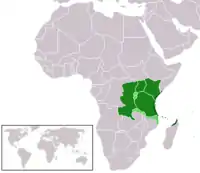What writing systems does this language use?
Although originally written in Arabic script, Swahili writing is now based on the Latin alphabet that was introduced by Christian missionaries and colonial governments.
The Swahili alphabet now contains all the same letters as English with the exception of q and x.
How many people speak this language?
About 5 million people speak Swahili as a native language. About 80 million people speak it as a secondary language. It is more common as a second language because it is used as a language of business in an area where there are many different tribal languages. People need to learn Swahili to buy and sell things with people who have other native languages.
native language — the first language that a person learnt as a child.
secondary language — any language that a person learns to speak after the first language that they learned at home.
Where is this language spoken?

People primarily speak Swahili in Zanzibar and Tanzania. There are smaller communities of Swahili speaking people in Burundi, Kenya, Mayotte, Mozambique, Oman, Rwanda, Somalia, South Africa, Uganda, United Arab Emirates, and the United States.
What is the history of this language?
It is uncertain where or how Swahili first came about but it is general believed that Swahili speaking people have occupied their present territories, hugging the Indian Ocean, since well before AD 1000.
It appears to some researchers that Swahili started in a number of Arabic trading posts. People speaking different dialects of Bantu, a local language, found that it was difficult to communicate with one another, so they adapted Arabic and Bantu to create a language for business, Swahili.
Who are some famous authors or poets in this language?
Utend̠i wa Tambuka, which means "The Story of Tambuka", is one of the oldest known pieces of literature in Swahili. The author of the story identifies himself as Mwengo, son of Athumani or Osman. Little is known of him. The story is about "the Byzantine-Arab Wars" and "Byzantine-Ottoman Wars" between the Muslims and Byzantines, covering a period from 628 AD to 1453 AD (the Fall of Constantinople). Like other early Swahili writing it was written with the Arabic script.
What are some basic words in this language that I can learn?
| Majibu | Responses |
|---|---|
| Ndiyo | Yes |
| Hapana | No |
| Labda | Maybe |
| Mahamkio | Greetings |
| Jambo ! | Hello ! |
| Hujambo ? | How are you ? |
| Sijambo | I'm fine |
| Habari gani ? | How are you ? |
| Salama | Fine |
| Hodi ? | Anyone home ? |
| Karibu ! | You're welcome ! |
| Karibuni ! | You're welcome ! (plural) |
| Kuachana | Good-byes |
| Kwa heri | Good-bye |
| Kwa herini | Good-bye (plural) |
| Tutaonana | See you later |
| Tutaonana kesho | See you tomorrow |
| Usiku mwema ! | Good night ! |
| Lala salama ! | Sweet dreams ! |
| Maneno ya maana | Useful phrases |
| Unasema kiingereza ? | Do you speak English ? |
| Choo kiko wapi ? | Where are the toilets ? |
| Tafadhali | Please |
| Asante | Thank you |
| Asante sana | Thank you very much |
| Jina lako nani ? | what's your name ? |
| Jina langu... | My name is... |
| Pole ! | Sorry ! |
| Safari njema ! | Have a good journey ! |
| Maneno machache | Some words |
| Mimi | I/me |
| Wewe | You |
| Yeye | He/him/she/her |
| Baba | Papa/père |
| Mama | Maman/mère |
| Nzuri | Good |
| Mbaya | Bad |
| Hapa | Here |
| Hakuna | There isn't |
| Hakuna matata | No problem |
| Nipe... | Give me... |
| Chakula | Food |
| Maji | Water |
| Gari | car |
| Shule | School |
| Soko | Market |
| Kituo cha mabasi | Bus stop |
| Stesheni | Railway Station |
| Polisi | Police |
| Askari | Soldier |
| Kitabu | Book |
| Simu | Telephone |
| Kusoma | to read/study |
| Kula | to eat |
| Kunywa | to drink |
| Yangu | My/mine |
| Yako | Your/yours |
| Wanaume | Gentlemen |
| Wanawake | Women |
| Nina | I have |
| Sina | I don't have |
| Nambari | Numbers |
| Moja | One |
| Mbili | Two |
| Tatu | Tree |
| Nne | Four |
| Tano | Five |
| Sita | Six |
| Saba | Seven |
| Nane | Eight |
| Tisa | Nine |
| Kumi | Ten |
| Wanyama | Animals |
| Paka | Cat |
| Mbwa | Dog |
| Ndege | Bird |
| Samaki | Fish |
| Ng'ombe | Cow |
| Mbuzi | Goat |
| Farasi | Horse |
| Punda | Donkey |
| Punda milia | Zebra |
| Simba | Lion |
| Twiga | Giraffe |
| Ndovu/Tembo | Elephant |
| Swala | Gazelle |
| Kiboko | Hippopotamus |
| Kifaru | Rhinoceros |
| Mbogo/Nyati | Buffalo |
| Nyoka | snake |
What is a simple song/poem/story that I can learn in this language?
Here are some interesting Swahili sayings that you can learn.
| Swahili | Literal Translation | What it means |
|---|---|---|
|
Bahati ya mwenzio usiilalie mlango wazi. |
"Do not leave the (front) door open and go to bed just because someone you know did the same thing but nothing happened to him." |
Don't be reckless just because others were lucky. |
|
Usitukane wakunga na uzazi ungalipo. |
"Don't insult the midwives as long as you are still able to bear children." |
Don't offend people that you might need help from later. |
|
Samaki mkunje angali mbichi. |
"Bend a fish while it is (still) fresh/wet." |
Children should be given guidance early in life (before it is too late). |
|
Ahadi ni deni. |
"A promise is a debt." |
You have to keep your promises. |
|
Riziki ni kujaribu. |
"Sustenance is to try." |
If you try your best, you can earn your living. |
|
Wema hauozi. |
"Mercifulness does not rot/decay." |
If you are merciful to others they will never forget you for that. |
References
Mwanasimba : Online Swahili course for beginners
Swahili Yesterday, Today and Tomorrow
Wikipedia: Swahili Language
A Selection of Common Swahili Proverbs/Sayings/Maxims and Riddles
 |
Wikijunior:Languages | ||
|
Introduction •
Glossary •
Authors and Contributing •
Print Version
| |||